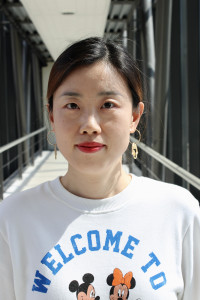PhD-student

Research:
The human genome contains approximately 3 billion base pairs. The rest of the genome is referred to as the non-coding genome. There is a piece of knowledge missing in our current understanding of the non-coding regulatory regions—the silencers. Currently, I am focusing on identifying many silencers in an unbiased fashion and in a systematic way. We could infer the epigenetic modifications around silencers to further facilitate the computational identification of all potential silencers or identify silencers using experimental assays like ChIP-seq. Thus, systematic identification of silencers will help link genetic changes within silencers to phenotypes better to understand the complex genetic states of many human diseases. Additionally, I am also interested in identifying regulatory regions in cancer genomes and defining these regions' functions, which may control resistance to cocktail drug treatments that are often used in the anti-cancer intervention. I will carry out the drug response test, NGS data analysis in our group (ATAC-seq, ChIP-seq, CRISPR screen, etc.).
Curriculum Vitae:
I received my master’s degree in Animal Science from Jilin University, mainly focus on using CRISPR/Cas9 to generate gene-modified rabbits and pigs for study the effects of genes on atherosclerosis. In addition, investigate the effects of resveratrol on experimental mice and human monocytic cells. Then I joined the group of Baoxu Pang for my Ph.D. study in 2020. I am working on projects about identifying non-coding regulatory elements (ultra-conserved regions, enhancers, silencers) involved in drug response.
Shengnan Sun, Mingjun Zhang, Qiangbing Yang, Ziying Shen, Jiahuan Chen, Biao Yu, He Wang, Jiali Qu, Daxin Pang, Wenzhi Ren, Hongsheng Ouyang, Xiaochun Tang.
Mol Nutr Food Res., 2017 Oct;61(10).
Chun Yang, Shengnan Sun, Qi Zhang, Jia Guo, Tengfei Wu, Ying Liu, Min Yang, Yan Zhang, and Yinghua Peng.
Stem Cells International., 2020 Mar 26;2020:2134565.



Looking for information on one of our topics, a new place to conduct your research or experienced research to join forces with? Feel free to contact us.!